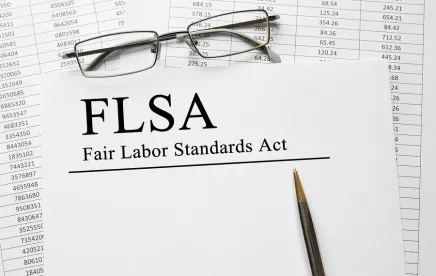On May 19, 2020, the United States Department of Labor’s Wage and Hour Division (WHD) implemented a final rule withdrawing partial lists of establishments that it previously interpreted as either having “no retail concept” or possibly having a retail concept for purposes of the Fair Labor Standards Act’s (FLSA) Section 7(i) overtime exemption for commissioned retail sales employees. Effective today, the rule allows all employers to apply a uniform analysis in determining whether they qualify as a “retail or service” establishment, without any predetermined industry restrictions.
FLSA’s Section 7(i) Exemption
Generally, the FLSA requires covered employers to pay employees overtime compensation for time worked in excess of 40 hours in a given workweek, unless the employees qualify for one or more of the exemptions set forth in Sections 7 or 13 of the statute. Section 7(i) exempts a “retail or service” establishment from the FLSA’s overtime requirements for certain commission-based employees. An employee of a “retail or service” establishment is eligible for the exemption so long as: (i) the employee’s regular rate of pay averages more than one and one-half times the applicable minimum wage for every hour worked in a workweek in which overtime hours are worked; and (ii) more than half the employee’s total earnings in a representative period comes from commissions.
The DOL’s interpretative regulations (found at 29 CFR Part 779) set forth certain criteria required for employers to qualify as a “retail or service establishment,” including that the employer have a “retail concept” (29 CFR 779.316). According to the DOL, an employer with a “retail concept” will typically sell goods and/or services to the general public, serve the day-to-day needs of the community, is at the very end of the stream of distribution, disposes in small quantities their products/skills, and does not take part in the manufacturing process (29 CFR 779.318).
In 1961, WHD implemented interpretive regulations setting forth two categorical lists – one containing industries that it viewed as “lacking” a “retail concept” (29 CFR 779.317), and thus prohibited from claiming the Section 7(i) exemption; and another including industries that “may be recognized” as having a “retail concept” (29 CFR 779.320), and thus could potentially claim the Section 7(i) exemption. The lists had not been amended since the early 1970s, and with few exceptions, the regulations provided no explanation for why certain industries were included on either list.
In the decades since the 1970s, the evolution of retail business models in the U.S. (especially in the technology and services industries, and away from brick-and-mortar retailers to online retail platforms) made the categorical lists in Part 779 of increasingly lower utility to employers. A number of the “establishments” on the lists seem painfully out of date (e.g., blacksmiths, public baths, and tobacco auction warehouses), and the lists do not address a number of 21st century businesses.
May 19 Final Rule
On May 19, 2020, WHD implemented a final rule withdrawing the above two categorical lists previously found at 29 CFR 779.317 and .320 from its regulations. Pursuant to the final rule, WHD will now apply the same analysis to all employers when determining whether they qualify as “retail or service” establishments. Employers that have been categorically excluded from claiming the Section 7(i) exemption may now assert that they have a “retail concept” so long as they satisfy the criteria set forth in 29 CFR 779.318 and other relevant regulations.
The final rule comes after years of judicial scrutiny regarding WHD’s categorical lists. For example, some federal courts have criticized the categorical lists as being “arbitrary” and exhibiting no “rational basis” for distinguishing among certain establishments. Others have opined that the list identifying establishments that “may be” recognized in the retail category had no meaningful impact, because analysis of whether the establishment met the relevant criteria for a “retail concept” was still required. Employers in industries that did not appear on either list struggled with whether they more resembled the businesses on the “no retail concept” or “may be” lists.
Implications
The final rule streamlines the “retail concept” analysis for employers and should promote a more consistent and logical approach to determining whether a business qualifies as a retail or service establishment for purposes of the Section 7(i) exemption, without the rigidity proscribed by the previous establishment lists. As the WHD concluded in issuing the final rule, the withdrawal of the partial lists provides for much-needed flexibility as industries evolve and the characteristics of businesses change over time.




 />i
/>i
